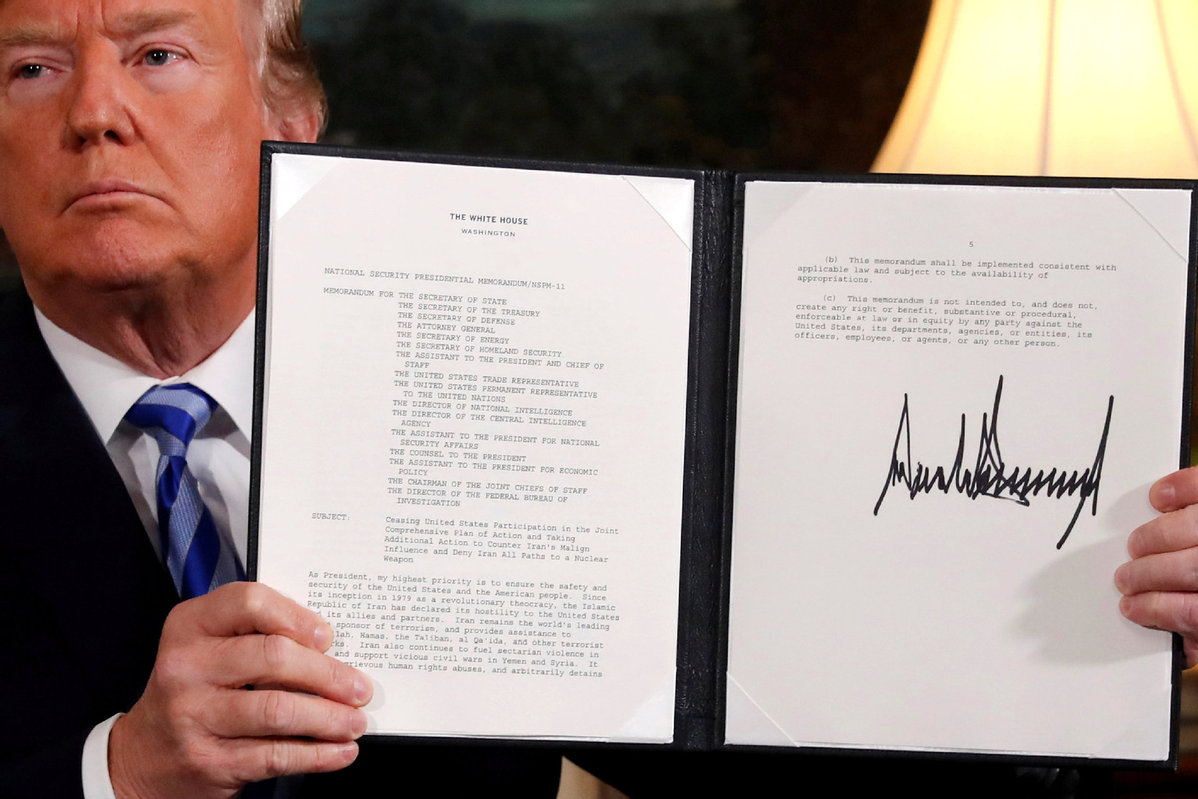With Iran deal withdrawal, Trump continues to disrupt global protocol
By Chen Weihua | China Daily USA | Updated: 2018-05-14 15:46

White House Press Secretary Sarah Sanders on April 5 touted President Donald Trump for running against political correctness in the United States. That is nothing but a cover-up for actions that are coercive and disruptive in nature.
Trump's announcement on May 8 to withdraw the US from the Iran nuclear deal, or the Joint Comprehensive Plan of Action (JCPOA), is the latest piece of evidence that the US cannot honor an international deal. The UN Security Council unanimously endorsed the deal, after it was reached on July 14, 2015, between Iran and five permanent members of the United Nations Security Council - the United States, China, Russia, Britain and France - plus Germany and the European Union.
The International Atomic Energy Agency has repeatedly affirmed in past years that Iran has been in compliance with the deal. Other parties in the agreement, including the US' close allies in Europe, have tried to dissuade the US from abandoning the deal.
Right after Trump's announcement last week, tensions flared up between Iran and Israel, with missiles fired on each other's targets.
If that is opening a Pandora's Box in the Middle East, as many have worried, the US decision to hold a ceremony on Monday for its embassy in Jerusalem is further fanning the flames in the volatile Middle East.
Last December, the UN General Assembly overwhelmingly denounced Trump's decision to recognize Jerusalem as Israel's capital and move the US embassy there, despite US Ambassador to the UN Nikki Haley's reckless threats to UN members who disrespected the US on the issue.
The embassy decision has not only shown that the US cannot be an honest broker for the Middle East, in particular between Israel and the Palestinians, but that the US is a major destabilizing force in the region.
These are just the latest US actions that violate global rules and norms. The Trump administration notified the UN last August that it intends to withdraw from the Paris climate accord reached by more than 190 countries in December 2015.
Last October, the US State Department announced that the US will withdraw from the UN Educational, Scientific and Cultural Organization (UNESCO) at the end of 2018. The US has also cut its funding to the UN.
To President Trump, every deal the US signed in the past is a bad deal if not the worst deal ever for the US. That is why the Trump administration has been whining and blaming almost every major trade partner for taking advantage of the US, despite the fact that the US has long been using its dominance in the global financial system, its economic power and military might to bully and coerce other nations, including its allies.
Both Canada and Mexico have complained about the US bullying in renegotiating the North American Free Trade Agreement (NAFTA) signed in 1994. In March, the Trump administration threatened new steel and aluminum tariffs if Canada and Mexico did not agree to its revisions to a new NAFTA deal. On Friday, Trump called NAFTA "a horrible, horrible disaster" for the US.
The Trump administration has also taken unilateral actions and made threats on trade and investment against China, including laying out unreasonable demands that China should cut its trade deficit with the US by $100 billion each year for the next two years and stop Chinese government subsidies to its industries. David Gergen, a professor at Harvard Kennedy School and an adviser to former US presidents, last week described Trump's behavior as "bullying China".
As a businessman-turned-politician, Trump should know better than anyone that honoring a deal matters more than anything else. Otherwise, why should anyone trust him or the US anymore in future negotiations?
That also includes the upcoming June 12 meeting between Trump and Democratic People's Republic of Korea leader Kim Jong-un in Singapore, which is probably one of the few positive steps taken by the Trump administration so far.
Credibility aside, there are a lot of hurdles to be cleared, not just on the DPRK side, but on the US side, as to what kind of compromise it is willing or able to make.
So far, most critics have used unilateralism and isolationism to describe Trump's "against political correctness" actions, but that is really a euphemism for behavior that disrupts and challenges global rules and norms and threatens world peace.
























